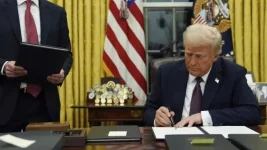Former President Donald Trump issued an executive order against South Africa on Thursday, threatening U.S. funding cuts over the nation's land reform policies and alleged human rights concerns.
The order targets South Africa's Land Expropriation Bill, which enables the government to acquire land without compensation under specific conditions. This legislation aims to redistribute property to Black South Africans who lost land during apartheid, though various international observers have expressed reservations.
Trump declared South Africa's land reforms unfairly single out certain groups and violate property rights. "The South African government is confiscating land and treating certain classes of people VERY BADLY," he stated. "This is unacceptable, and the United States cannot stand by when human rights are being undermined."
The directive instructs U.S. agencies to evaluate funding and assistance programs to South Africa, suggesting substantial reductions unless the country addresses these issues. Trump called for a complete investigation into the land reform process, declaring funding suspended until resolution.
South African President Cyril Ramaphosa defended the policy as essential for justice and equality, rejecting Trump's accusations of human rights violations. "Our land reform program ensures equitable access to land for all South Africans," Ramaphosa said in a televised address. "It is not about confiscation or mistreatment; it creates a more inclusive future by correcting past injustices."
Ramaphosa stressed the policy's alignment with South Africa's constitution and legal framework. He voiced concerns about potential U.S. funding cuts affecting crucial programs, including HIV/AIDS prevention and treatment services dependent on international support.
Global reactions remain divided. Critics view Trump's intervention as overstepping boundaries, disregarding South Africa's historical context and current inequality challenges. Supporters share their concerns about property rights and the economic implications of land seizures.
The announcement has intensified domestic debates over land reform policy. Opposition groups demand increased transparency in implementation. Civil society organizations have denounced Trump's portrayal, arguing it misrepresents facts and challenges South African sovereignty.
The U.S. State Department awaits the release of specific enforcement details and affected programs. Analysts suggest these actions might strain diplomatic relations between both nations and affect broader U.S. engagement across Africa.
Ramaphosa maintains South Africa's dedication to land reform, encouraging international partners to engage in constructive dialogue rather than sanctions. "We stand resilient, pursuing policies promoting justice, equality, and economic growth for all our people," he affirms.
This executive order escalates Trump's criticism of South African land reforms, a subject he frequently addresses through social media and public statements. It highlights the complexity of managing domestic policy priorities alongside international human rights considerations in our interconnected world.
The order targets South Africa's Land Expropriation Bill, which enables the government to acquire land without compensation under specific conditions. This legislation aims to redistribute property to Black South Africans who lost land during apartheid, though various international observers have expressed reservations.
Trump declared South Africa's land reforms unfairly single out certain groups and violate property rights. "The South African government is confiscating land and treating certain classes of people VERY BADLY," he stated. "This is unacceptable, and the United States cannot stand by when human rights are being undermined."
The directive instructs U.S. agencies to evaluate funding and assistance programs to South Africa, suggesting substantial reductions unless the country addresses these issues. Trump called for a complete investigation into the land reform process, declaring funding suspended until resolution.
South African President Cyril Ramaphosa defended the policy as essential for justice and equality, rejecting Trump's accusations of human rights violations. "Our land reform program ensures equitable access to land for all South Africans," Ramaphosa said in a televised address. "It is not about confiscation or mistreatment; it creates a more inclusive future by correcting past injustices."
Ramaphosa stressed the policy's alignment with South Africa's constitution and legal framework. He voiced concerns about potential U.S. funding cuts affecting crucial programs, including HIV/AIDS prevention and treatment services dependent on international support.
Global reactions remain divided. Critics view Trump's intervention as overstepping boundaries, disregarding South Africa's historical context and current inequality challenges. Supporters share their concerns about property rights and the economic implications of land seizures.
The announcement has intensified domestic debates over land reform policy. Opposition groups demand increased transparency in implementation. Civil society organizations have denounced Trump's portrayal, arguing it misrepresents facts and challenges South African sovereignty.
The U.S. State Department awaits the release of specific enforcement details and affected programs. Analysts suggest these actions might strain diplomatic relations between both nations and affect broader U.S. engagement across Africa.
Ramaphosa maintains South Africa's dedication to land reform, encouraging international partners to engage in constructive dialogue rather than sanctions. "We stand resilient, pursuing policies promoting justice, equality, and economic growth for all our people," he affirms.
This executive order escalates Trump's criticism of South African land reforms, a subject he frequently addresses through social media and public statements. It highlights the complexity of managing domestic policy priorities alongside international human rights considerations in our interconnected world.












